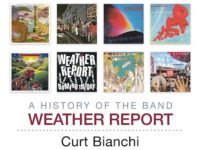(Video is for original version of “Seventh Arrow”, not the rendition found on the album reviewed below.)
Miroslav Vitous is always looking forward, even when he casts his gaze back. That was the brilliance of his quasi-tribute to the indispensible rock/jazz band he co-founded, Weather Report, the all-acoustic Remembering Weather Report (2009). There, he honored the artistic achievement of that band — especially the Vitous/Joe Zawinul/Wayne Shorter version of that band – tangentially, by reconnecting in new ways with old music that were building blocks of Weather Report’s originally boundless concept.
Seven years hence, the virtuoso bassist from Prague is ready for a direct homage to this band, again in a manner that makes the effort more like art itself rather than the mere celebration of art. For Music Of Weather Report (July 8, 2016, ECM Records), he takes on directly the music of the WR and doing so with a mixture of acoustics and ring modulator-era electronics that has a resonance which only adds to the depth of the music, not distract from it. Gary Campbell (saxophones) and Gerald Cleaver (drums) from Remembering rejoin Vitous for Music and are completed by Roberto Bonisolo (saxes), Aydin Esen (keyboards) and Nasheet Waits (drums).
Just as Vitous used ingenuity in picking the songs to cover and how to interpret them as the framework for Remembering, so are these tactics cleverly used for Music. It’s natural to believe he will be covering WR songs from the time of his stint there and he does: his own compositions from the self-titled debut “Morning Lake” and “Seventh Arrow” are revisited. But then Vitous also takes on post-Vitous songs and reshapes them in ways that are certainly inspired by the wide open esprit championed by the band during his time there.
“Scarlet Woman Variations,” based on the “Scarlet Woman” track originally found on the first post-Vitous album Mysterious Traveller, is a sonic painting to behold: the uneasiness, the searching and the intergalactic spirits mingling with the ghost of Charlie Parker. As the title makes clear, this is improvisation using the oblique theme as a random reference point but from there, everyone is arranging in the moment. The florid impressions they collectively leave behind gets right at the heart of the mindset of that original lineup in creating beauty and emotion using technology and chops as a means to that end, and not as ends unto themselves. No more is that exemplified as when Vitous himself wrings real humanity from his bass when he bows with a wah-wah pedal that could have gone on a little longer. In fact, it does, on “Scarlet Reflections.” On this separate coda, the theme itself seems to melt right into a new melody with the backing of only an electric piano and soprano sax.
There’s another angle the Vitous employs to take these tunes even further, and that’s in how he exploits the two saxophonists and two drummers he has at his disposal. Not only does he scramble and abstracts the hell out of the multi-motif “Birdland,” but has one drummer vacillate between 4/4 and free while the other is waltzing on 3/4 time, leaving it up to the saxophonists to choose which tempo play along to. An interesting unison of Vitous’ arco fx bass along with soprano and tenor sax relay the main melody of Shorter’s “Pinocchio” (covered on WR’s Mr. Gone LP) while Esen is working behind the scenes to reconstruct it in a progression that Miles Davis himself likely would have approved of.
“Seventh Arrow,” one of the two pieces from that 1971 debut that Vitous alone penned, is performed looser this time, like an unrestrained “John McLaughlin” (from Miles’ Bitches Brew) and it’s a real treat to hear two of jazz’s elite drummer letting it all hang out side-by-side. “Morning Lake” floats along as a stream, with diversions down side alleys that always reconnect to Vitous’ transcendent pattern, until an actual storm from outside the studio erupts. Perhaps taken as signal that the connection between the weather and Weather Report is not coincidental, the thunderous noises were retained for the album.
Sprinkled throughout Music are mostly brief, blues-based improvs that like “Birdland Variations” experiment with tandems of musicians performing in competing tempos but somehow relate to each other.
When Zawinul died, much of the essence of Weather Report went with him. But it’s the still-living, still-thriving Miroslav Vitous who is the true keeper of the seminal Weather Report, Mk I flame. He strongly implied why this era was so important before; now, with Music Of Weather Report, he makes that point explicitly and abundantly clear. Like the music Vitous seeks to evoke, this is fusion jazz at its peak.
- Ches Smith Quartet – ‘Clone Row’ (2025) - May 30, 2025
- James Brandon Lewis Quartet – ‘Abstraction Is Deliverance’ (2025) - May 27, 2025
- Soft Machine – ‘Drop’ (1971, 2025 remaster) - May 21, 2025



